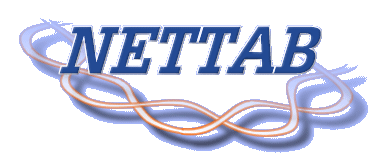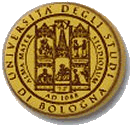
Agents in Bioinformatics July 12th - 14th, 2002 Ex Scuola Ercolani, University of Bologna, Mura Anteo Zamboni 2b, Bologna, Italy |
 Telematics Applications in Biotechnology  Biotechnology Department National Cancer Research Institute - Genova |
Call Overview
Attention: The Call is now closed
The Call for papers is now closed. What follows is the text of the call.
We are glad to announce that a Joint Call for Papers has been agreed between the NETTAB 2002 Workshop on "Agents in Bioinformatics" and the BIXMAS 2002 Workshop on "Bioinformatics and Multi-Agent Systems".
BIXMAS 2002 is an
AAMAS 2002
(Autonomous Agents and Multi-Agent Systems) workshop, and NETTAB 2002
is co-located with it.
The AAMAS 2002 Joint Conference will be held in Bologna,
Italy, from July 15 to 19, 2002. NETTAB 2002 will also be
held in Bologna, from July 12 to 14, 2002, while the BIXMAS
workshop will run on July 15 or 16, 2002.
These workshops are now closely related, so that anybody planning to attend AAMAS could decide to attend BIXMAS and NETTAB too.
Chairs and programme committees of above workshops have agreed to share a common Call for Papers, while keeping the respective workshops scopes and aims.
The NETTAB 2002 workshop is mainly devoted to biologists facing the issues related to the technological innovation and research in their working environment, while keeping as the main goal the achievement of significant biologically relevant results.
The BIXMAS 2002 workshop, on the other hand, is devoted to computer scientists having agents and multi-agent systems as their main goal of research and desiring to identify new fields where these tools can find a proper and useful application.
The two workshops, then, can be seen as a unique event, split into two sections, where biologists and computer scientists co-operate within their respective groups and between them to identify those applications where agents and multi-agent systems can find their most adequate application and, at the same time, to study the specificities of this field and the related technological issues.
In this respect, the two workshops will strictly co-operate, e.g., by contributing with technical lectures in the NETTAB workshop and with biologically minded lectures in the BIXMAS workshop.
Category of papers have been identified as follows:
-
Oral communications: both workshops foresee oral communications.
Researchers wishing to submit an oral communication can specify
the workshop they wish to submit to, but we strongly encourage
them to submit to both workshops by selecting the proper option
in the submission form.
All oral communications submitted to the NETTAB workshop are at the same time submitted as posters, should not they be selected as oral communications. - Posters: all posters will be admitted to the NETTAB workshop. The BIXMAS workshop does not foresee any poster session.
- Position papers: all position papers are submitted to the BIXMAS workshop. The NETTAB workshop does not make difference between position papers and posters: the former should be submitted as poster.
Submission rules - at now closed
Authors were encouraged to:
- submit a full paper (max 8 A4 pages in length, size 12pt, in pdf or ps format) as an oral communication
- submit a poster or position paper (max 3 A4 pages, size 12pt, in pdf or ps format)
All contributions should possibly have been submitted according to the ACM conference proceedings style.
The contributions have been uploaded to both workshops through the Paper Review System. New submissions are currently not accepted.
The complete text of the NETTAB 2002 Call for Contributions is available here below. The BIXMAS 2002 Call for Papers is also available in the BIXMAS web site.
NETTAB 2002 Call for Contributions (currently closed)
You can also find this Call in Adobe PDF, RTF Rich Text Format, PS Postscript and MS Word formats.
Scope
Agents and multi-agent systems are the emerging new way of computing. The integration of biological data resources will deal, in the Semantic Web Generation, with agents and software robots.
In the last five years there has been a growing interest in the application of agent-based systems in different fields such as e-commerce, transports and health. Agent based systems and applications are well suited to support bioscientists during the process of genome analysis and annotation, so as to the problems of effectively managing and improving the processes that are involved with protein structure prediction.
Some specialized projects in this topic are beginning to appear. It may now be a good time to report on the results achieved in this area, to discuss the benefits (and drawbacks) that agent-based systems may bring to bioinformatics domains, and also to provide a list of the research topics that should be tackled in the near future to make the deployment of bioinformatics agent-based systems a reality.
The aim of this workshop is to bring together who are working towards the vision of a genome analysis and annotation using agents-based systems. The workshop will also aim to inspire collaboration between these two communities, to strengthen the relationships within bioinformatics community, to activate an osmosis cooperation between bioinformatics and computer science communities, to collect the latest ideas, achievements and proposals in the application of agents and multi-agent systems to the bioinformatics area.
The worshop is organized in sessions where invited speakers present the state of art of relevant ongoing projects, sessions for oral communications and a tutorial day. See the Scientific programme.
Topics
Submitted contribution (both oral communicatons and posters) had been addressed at least one of the following issues:
- Co-operation between intelligent agents to improve information retrieval in bioinformatics.
- Multi-agent systems to support eScientists during their daily research.
- Agents applications in bioinformatics.
- Multi-agent systems that improve the data resources integration.
- Bioinfomatics agent-based decision support systems.
- Information agents that gather, compile and organise biological knowledge available on Internet.
- Biological data and knowledge modeling tools
- Ontologies, Databases and Applications of Semantics in Bioinformatics
Submission of contributions
Authors were encouraged to:
- submit a full paper (max 6 A4 pages in length, size 12pt, in pdf or ps format) as an oral communication
- submit a research statement (max 2 A4 pages, size 12pt, in pdf or ps format) as a poster
Full papers (category 1) have been reviewed by the programme committee for relevance, clarity and the novelty of results. After the event, a second round of more extensive reviews is planned which is to lead to the publication of extended versions of selected contributions in an edited collection.
Accepted full papers and posters (category 2) will be published in the conference proceedings.
Posters and informal research demonstrations provide an opportunity to exhibit late-breaking results and to discuss these results with conference participants in an informal setting. We encouraged submissions based on new work, including work that is in progress. Informal research demos can take place during poster presentation. Presenters need to bring whatever equipment they need for their demonstration; Internet connectivity can be made available upon request. Proposals should consist of a summary (max 2 page) of the work to be presented.
The contributions have been uploaded through the Paper Review System.
Scientific Programme
Overview -
Invited Speakers
Programme Outline
Call for Contributions
Overview
Scope -
Topics
Type of contributions
Deadlines
Registration Form
Overview
Subscribe mailing list
Submit a contribution
Useful Info
Contacts -
How to reach
Deadlines -
Hotels
Fees -
External links
Workshop Organization
Scientific Committee
Organizing Committee
Institutes & Societies
Sponsors

